
Each month, for your literary listening pleasure, our friends at AudioFile Magazine bring us the cream of the audiobook crop.
This month’s haul of harmonious audiobooks includes Michelle Obama’s The Light We Carry (read by the author), Grady Hendrix’s How to Sell a Haunted House (read by Mikhaila Aaseng and Jay Aaseng), and Prince Harry’s Spare (read by the author).
*
FICTION

The Seven Moons of Maali Almeida by Shehan Karunatilaka | Read by Shivantha Wijesinha
AudioFile Earphones Award
[HighBridge Audio | 14.25 hrs.]
The 2022 Booker Prize novel is also one of its most compelling audiobooks. Actor and musician Shivantha Wijesinha is the novel’s voice brought to life, an immensely talented audiobook performer who evokes a range of Sri Lankan characters with subtlety and vigor that match the author’s own. Set in a violent phase of Sri Lanka’s recent history, the story is often grim—but also deliciously ingenious and suspenseful. The narrator, recently murdered, reconstructs a storyline in which the afterlife exists simultaneously with the living world and the victim tracks down his own killer.

How to Sell a Haunted House by Grady Hendrix | Read by Mikhaila Aaseng, Jay Aaseng
AudioFile Earphones Award
[Penguin Audio | 13 hrs.]
Narrator Mikhaila Aaseng gives a chilling performance of this horror story. Louise reluctantly returns to her family home after her parents die. As she’s forced to work with her estranged deadbeat brother in order to clean and sell the property, she learns that the house has other plans. Louise is voiced with crisp logic, then Aaseng’s masterful pacing perfectly ramps up the tension, immersing listeners in Louise’s rising panic. Jay Aaseng casually narrates a brief segment from the brother’s point of view, revealing horrifying truths.

The Night Travelers by Armando Lucas Correa | Read by Edoardo Ballerini
AudioFile Earphones Award
[Simon & Schuster Audio | 9.75 hrs.]
Edoardo Ballerini is in excellent form as he provides a gripping performance. Lilith is born into the omnipresent terror of Nazi Germany. Her mother eventually makes the heartbreaking choice to send her, alone, to Cuba, for the possibility of a better life. Once there, Lilith embarks on a second life, never knowing what happened to her mother while becoming a mother herself. Listeners are transported from Germany to Cuba and New York City, and Ballerini’s masterful presentation enhances the emotional impact of the final passages.
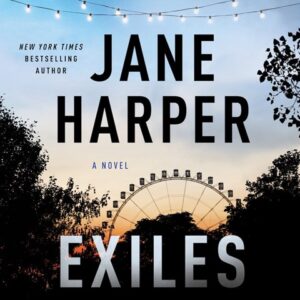
Exiles: Aaron Falk, Book 3 by Jane Harper | Read by Stephen Shanahan
AudioFile Earphones Award
[Macmillan Audio | 10.5 hrs.]
Stephen Shanahan returns to portray Aaron Falk, who is in South Australia’s wine country to attend his godson’s christening. As he and the child’s father catch up, talk turns to a cold case involving a missing woman. Shanahan’s native Australian accent and easygoing tone help set the scene as Falk becomes ever more involved in helping his friends figure out what happened. The dialogue and narrative flow naturally, infused with believable emotions that underscore Shanahan’s grasp of the author’s style.

Rachel: A Play in Three Acts by Angelina Weld Grimké | Read by Leon Nixon, Tamika Katon-Donegal, Sean Crisden, Karen Chilton, Cary Hite, Adenrele Ojo, Shayna Small, Cortney Wright, Ron Butler
AudioFile Earphones Award
[Brilliance Audio | 3.25 hrs.]
Leading a cast of well-established, award-winning African American voice talents, Tamika Katon-Donegal gives a voice full of bright sensitivity, intelligence, and hope to Rachel, a young early-twentieth-century Black woman. When Rachel runs headlong into the real-life horrors of American racism, she doubts whether she can follow her dreams. Written by author, teacher, and activist Angelina Weld Grimké, the play was first performed in 1916 and is presented here as a staged reading with directions and notes delivered by the narrator (Leon Nixon). A wonderful rediscovered gem of African American theater.
**
NONFICTION
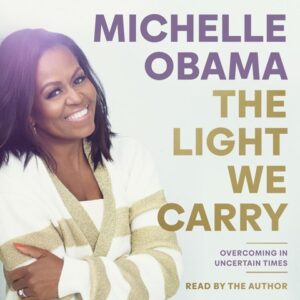
The Light We Carry: Overcoming in Uncertain Times by Michelle Obama | Read by Michelle Obama
AudioFile Earphones Award
[Random House Audio | 10 hrs.]
Michelle Obama performs the follow-up to her bestselling memoir, BECOMING, giving listeners another peek at her life. This time, Obama aims to inspire listeners to become their best selves, giving practical advice and using illustrations from her own life. Her deeply personal stories show listeners how she has worked her way through obstacles. Obama creates a lovely sense of kindness and emotional intimacy that make listeners feel hopeful and ready to go out and face our chaotic world.
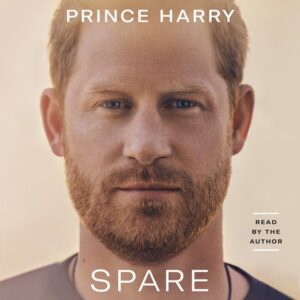
Spare by Prince Harry, The Duke of Sussex | Read by Prince Harry, The Duke of Sussex
[Random House Audio | 15.5 hrs.]
Stifled by protocol his entire life, Prince Harry has a lot to say as he addresses rumors and lies in his memoir. His narrative style reflects a strong reserve of emotions, and his performance remains at an emotional distance for most of the audiobook. Occasionally, such as when he discusses his military service in Afghanistan, his fear and anger come through, and when he recounts his confrontation with his brother, William, his pace quickens. Harry’s fascinating journey doesn’t disappoint, and this audiobook provides glimpses of the many emotions that lie beneath his seemingly relaxed, reserved exterior.
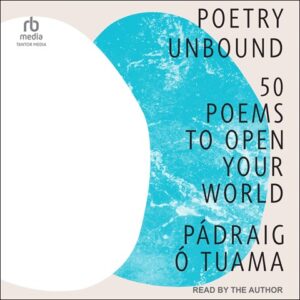
Poetry Unbound: 50 Poems to Open Your World by Pádraig Ó Tuama | Read by Pádraig Ó Tuama
AudioFile Earphones Award
[Tantor Media | 7.25 hrs.]
Based on the popular podcast “Poetry Unbound,” this audiobook is a fine anthology of poetry as well as a very good introduction to how to think about poetry. Even old poetry hands will enjoy and appreciate Pádraig Ó Tuama’s brief and insightful essays accompanying each poem, as well as the poems themselves. Ó Tuama clearly has thought deeply about how poems should sound, and even the shortest here (only 10 words long) is given shades of meaning by his performance. He is an especially good interpreter of poetry, both as a critic and as a reader.

Waypoints: My Scottish Journey by Sam Heughan | Read by Sam Heughan
AudioFile Earphones Award
[Hachette Audio | 7.75 hrs.]
Sam Heughan, Outlander’s Jamie Fraser, recounts his journey across the 96 miles of Scotland’s West Highland Way. The story becomes a metaphor for Heughan’s life as an actor in this atmospheric and absorbing memoir. He gives a spirited and heartwarming performance as he interweaves stories of becoming an actor into the details of his arduous trek across the magnificent Scottish landscape. His swoon-worthy Scottish accent highlights his charm and self-effacing humor, and the inclusion of live recordings made during Heughan’s hike, complete with the sounds of strong wind and heavy rain, are a lovely addition.
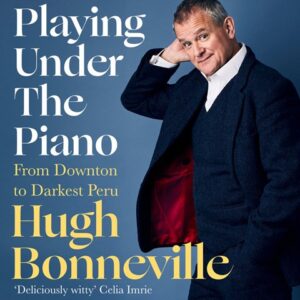
Playing Under the Piano: From Downton to Darkest Peru by Hugh Bonneville | Read by Hugh Bonneville
AudioFile Earphones Award
[Random House Audio | 10.25 hrs.]
Hugh Bonneville’s memoir is funny, personal, informative, insightful, and fun to listen to. The world-class British actor has a stunning list of credits and famous friends, as well as an abundance of anecdotes, which he delivers with self-deprecating humor. Probably best known to American audiences as the Earl of Grantham in “Downton Abbey,” Bonneville has also worked with the Royal Shakespeare Company. He opens himself up with stories from his private life and takes us behind the scenes at “Downton.” This well-written memoir is delivered with the timing, pace, and skill of a seasoned raconteur.

Paul Harding’s This Other Eden, Janet Malcolm’s Still Pictures, Bret Easton Ellis’ The Shards, and Colm Tóibín’s A Guest at the Feast all feature among January’s best reviewed books.
1. After Sappho by Selby Wynn Schwartz
(Liveright)
8 Rave • 5 Positive • 1 Mixed • 1 Pan
“Wynn Schwartz makes use of a multitude of literary sources, though she rarely quotes directly. Instead she practises a kind of ventriloquism, not quite fictive, and at the same time subverting the genres of biography and literary criticism. Her style might be called hybrid, though the label doesn’t capture the pleasures of its originality or inventiveness … Some reviewers have questioned the ethics of moving so freely between fact and fiction in writing these women’s lives. In an extended biographical note the author describes her fragments as ‘speculative biographies,’ and this feels closest to the truth … It is a quietly radical technique, and not without risk. But Wynn Schwartz pulls it off. How else, these writers ask, to account for the lives of the unaccounted?”
–Harriet Baker (TLS)
2. This Other Eden by Paul Harding
(W. W. Norton & Company)
9 Rave • 1 Mixed
Read an excerpt from The Other Eden here
“Stunning … You could imagine lots of ways a historical novel about this horror might be written, but none of them would give you a sense of the strange spell of This Other Eden—its dynamism, bravado and melancholy. Harding’s style has been called ‘Faulknerian’ and maybe that’s apt, given his penchant for sometimes paragraph-long sentences that collapse past and present … [An] intense wonder of a historical novel.”
–Maureen Corrigan (NPR)
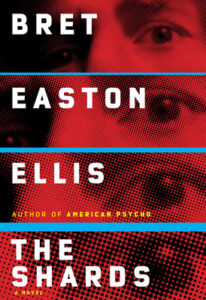
3. The Shards by Bret Easton Ellis
(Knopf)
6 Rave • 8 Positive • 6 Mixed • 3 Pan
“A genuine literary event … Others before Ellis have attempted to retool the serial narrative for the internet age. Nothing has felt quite as thrilling as Ellis’s year-long, hour-by-hour performance of The Shards … Any lingering uncertainty that its brilliance lay more in the recitation than the writing can be dispensed with. The Shards isn’t just Ellis’s strongest novel since the 90s, it’s a full-spectrum triumph, incorporating and subverting everything he’s done before and giving us, if we follow the book’s ingenious, gleefully self-aware conceit, nothing less than the Ellis origin story … Superficially, The Shards cleaves to Ellis’s well-established aesthetic. The dialogue is deadpan, the atmosphere paranoid and tacitly hostile. Sex is graphic and anhedonic; violence is lurid and sexualised. But beneath the coldness and carnage, a new, gentler quality is detectable … We realise the precision and subtlety of its metatextual structure. The concluding violence is both climax and origination.”
–Sam Byers (The Guardian)
**
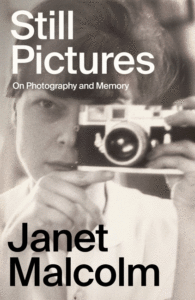
1. Still Pictures: On Photography and Memory by Janet Malcolm
(FSG)
9 Rave • 6 Positive • 2 Mixed
“Superb … How could a writer so famously, effectively skeptical of subjective stories write an autobiography? Malcolm solves the problem with characteristic elegance: Nearly every short chapter of Still Pictures is headed by a grainy black-and-white photograph, whose calls to memory she heeds, repels and bargains with in turn by subtle turn. Her comfort with incompleteness becomes a virtue … Most of this memoir consists of appreciative and often very dryly funny memories of her devoted, literate family … Still Pictures has the clarity and brevity of a book by a writer who knows that time is short, and that there’s much to say, much to convey, which will otherwise be lost forever … A lot gets lost in that transition, Malcolm argues in this final, splendid, most personal work of her long career. A lot—but not everything.”
–Charles Finch (The New York Times Book Review)
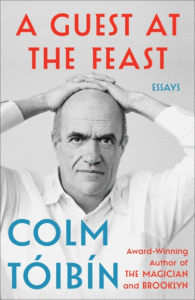
2. A Guest at the Feast by Colm Tóibín
(Scribner)
9 Rave • 5 Positive
“Sumptous … This deceptively slim memoir expands out into something far greater than you might expect. In what amounts to not much more than a long magazine article, he creates a sweeping, lyrical portrait of the small-town idiosyncrasies, natural landscapes and family histories in southeast Ireland on which his novels have drawn for three decades … But fittingly, it’s precisely the details of that provincial world (the setting of so many of his novels) that Toibin conjures up superbly here.”
–Robert Collins (The Times)
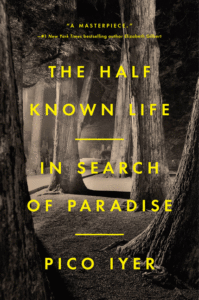
3. The Half Known Life: In Search of Paradise by Pico Iyer
(Riverhead)
9 Rave • 2 Positive • 1 Mixed
Read an excerpt from The Half Known Life here
“In Iyer’s hands, the search for paradise, the way out of the ego, doubles as an internal journey … No stranger to the travel genre, the prolific Iyer is after something more here. His chronicle, which begins with an appreciation of the sophistication, beauty and culture of Iran, becomes a requiem for a world—and an existence—estranged from itself … A lonely, nostalgic and haunted quality emerges as Iyer casually intersperses bits of his personal history. There is a formula to many of the chapters … Empathy is not the only thing going on; Iyer is also looking within. And as he looks, things get dizzier and dizzier.”
–Mark Epstein (The New York Times Book Review)
This week’s quintet of quality reviews includes Danez Smith on Paul Harding’s This Other Eden, Scott Bradfield on Bob Blaisdell’s Chekhov Becomes Chekhov, David L. Ulin on Paul Auster’s Bloodbath Nation, Ron Charles on Aleksandar Hemon’s The World and All That It Holds, Mattilda Bernstein Sycamore on Selby Wynn Schwartz’s After Sappho.
“All are rendered humble, human, particular and luminous in Harding’s long, poetic sentences … started to tense, weary of wading deeper into this story that I knew must end in violence and displacement for its poor, Black cast … Yet the passages that put me on guard are the same ones that disarmed me. Harding’s prose is mesmerizing … Whatever apprehensions I had were outweighed by Harding’s powerful music … Despite Harding’s lush prose, there is a curiosity to these characters, to this world: Until their foreshadowed displacement, it seems the residents of Apple Island move about with little to no awareness of the racial politics of their day … This novel could be more focused on the turbulence of their eugenics-fueled expulsion, but instead we’re offered moments of family, connection and resilience, which only make the instances of violence and extrication more unsettling and explosive. With the fall of this Eden looming in the wings of the novel, what a careful and caring choice to spend so much time in the grandeur of the lives of the banished … Not without complication, not without terror, This Other Eden is ultimately a testament of love: love of kin, love of nature, love of art, love of self, love of home. Harding has written a novel out of poetry and sunlight, violent history and tender remembering. The humans he has created are, thankfully, not flattened into props and gimmicks, which sometimes happens when writers work across time and difference; instead they pulse with aliveness, dreamlike but tangible, so real it could make you weep.”
–Danez Smith on Paul Harding’s This Other Eden (The New York Times Book Review)
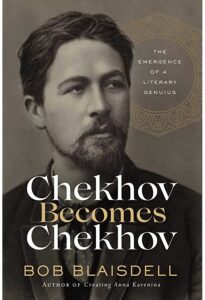
“What distinguished both the young and middle-aged Chekhov was his continuing capacity for intensive, daily, unremitting work—whether he was studying for medical exams, writing stories and humor pieces, or pouring out correspondence filled with well-considered advice to those he loved … As Chekhov’s most engaging biographer, Ernest Simmons, once put it: Chekhov ‘loved life more than the meaning of life.’ He took his pleasures small, intimate, and frequent. He was quietly magnanimous and privately monumental—the exact opposite of Tolstoy, who strode widely on the world stage but at home remained a distant, irreproachable personality, especially to his wife and children. Bob Blaisdell’s new biography, Chekhov Becomes Chekhov, is absorbing, pleasurable, and as unaffected as its subject; and while describing Chekhov’s life through close readings of his multitudinous stories and correspondence over two years—1886 to 1887—he doesn’t simply (as the title promises) explain how Chekhov came to be Chekhov but rather how impossible it was for him to become anybody else … this almost stolid intrepid reading of Chekhov’s daily productions is what makes this book so pleasurable. It’s the sort of book that dedicated readers rarely find, one that doesn’t presume to teach us about Chekhov so much as simply enjoy him. It is like reading along with a fellow lover of Chekhov, attentive to the nuances of the life behind the work and yet never absorbed by anything but Chekhov’s inexhaustible affection for the odd, brave, ridiculous, grotesque, noble, brutal, and always marvelously understandable people he knows so well.”
–Scott Bradfield on Bob Blaisdell’s Chekhov Becomes Chekhov (The New Republic)
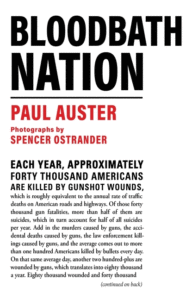
“As a meditation on American gun violence, Bloodbath Nation seems an odd book for Auster to have produced; he is known as a novelist, after all … Auster, however, is not interested in the standard us-and-them narrative of guns in the United States: the Second Amendment absolutists or those who oppose them, the tired arguments about right and wrong, left and right. Rather, he means to take a more historical (which is to say: narrative) perspective … Ostrander contributes forty-one images, each in its way as riveting as Auster’s text … The power of Auster’s book is that it never blinks in articulating this dilemma, that it doesn’t let anybody off the hook. Gun violence in the United States is a collective problem, after all—which also means, as Bloodbath Nation argues so compellingly, that it is a collective responsibility.”
–David L. Ulin on Paul Auster’s Bloodbath Nation (4Columns)
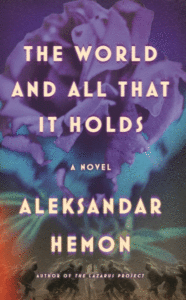
“The World and All That It Holds would be an audacious title for a book by anybody except God — or Aleksandar Hemon. But this Bosnian American author will make you a believer … Charismatic … Sounds awfully grim, I know, and there’s plenty of horror in these fiery pages, but the irrepressible voice of The World and All That It Holds glides along a cushion of poignancy buoyed by wry humor. From start to finish, no matter what else he’s up to, Hemon is telling a tale about the resilience of true love … The plot’s inexhaustible invention is just one of this novel’s wonders. The other is Hemon’s mysterious narrator. He speaks from the future but resides incarnate in these characters … The real miracle of The World and All That It Holds is that despite holding so much, we come to know the fragile joys of this one melancholy man so well that he feels written into our own past.”
–Ron Charles on Aleksandar Hemon’s The World and All That It Holds (The Washington Post)
“The twin currents of lesbian desire and creative self-invention drive Schwartz’s narrative, an informal history of the emergence of modernism, told through interconnected anecdotes about real-life women artists, writers, intellectuals, actors, translators, dancers and feminist troublemakers in Europe at the turn of the 20th century … The novel’s greatest innovation may be the way its disparate subjects fashion a collective we of lesbian world-making and feminist activation. This we transcends time and place; it can maneuver both inside and outside history, in opposition to the forward march of misogyny and patriarchy, war and marginalization. ‘Some acts can only be written as fragments,’ Schwartz writes. Her story, in kind, forms and re-forms itself through fragments… which float between and beyond boundaries … Is it a novel if it doesn’t have fictional characters so much as meticulously researched historical portraits of artistic luminaries? … Schwartz builds a novel around women’s struggles for self-determination, excising the men who were in their way. The novel is erudite and chatty, grounded in scholarship yet freed from any masculinist impulse for certainty or linear cohesion. She draws from history in order to reimagine it.”
–Mattilda Bernstein Sycamore on Selby Wynn Schwartz’s After Sappho (The New York Times Book Review)
Bret Easton Ellis’ The Shards, Colm Tóibín’s A Guest at the Feast, and Grady Hendrix’s How to Sell a Haunted House all feature among the Best Reviewed Books of the Week.

1. The Shards by Bret Easton Ellis
(Knopf)
5 Rave • 7 Positive • 5 Mixed • 2 Pan
“A genuine literary event … Others before Ellis have attempted to retool the serial narrative for the internet age. Nothing has felt quite as thrilling as Ellis’s year-long, hour-by-hour performance of The Shards … Any lingering uncertainty that its brilliance lay more in the recitation than the writing can be dispensed with. The Shards isn’t just Ellis’s strongest novel since the 90s, it’s a full-spectrum triumph, incorporating and subverting everything he’s done before and giving us, if we follow the book’s ingenious, gleefully self-aware conceit, nothing less than the Ellis origin story … Superficially, The Shards cleaves to Ellis’s well-established aesthetic. The dialogue is deadpan, the atmosphere paranoid and tacitly hostile. Sex is graphic and anhedonic; violence is lurid and sexualised. But beneath the coldness and carnage, a new, gentler quality is detectable … We realise the precision and subtlety of its metatextual structure. The concluding violence is both climax and origination.”
–Sam Byers (The Guardian)
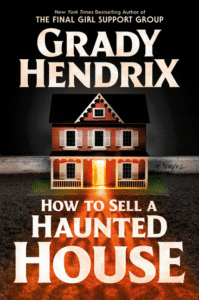
2. How to Sell a Haunted House by Grady Hendrix
(Berkley)
5 Rave • 2 Positive
“In this tale of ghostly happenings and creepy objects, the human drama at the core of it all is often even scarier than the supernatural … Trappings exist to remind you what kind of story you’re reading, and to create a certain atmosphere, but they’re also there so Hendrix can carefully, delicately, and thrillingly reinvent them to his own ends … Every time you think How to Sell a Haunted House can’t get more jaw-dropping, along comes the author with another reveal, another left turn that’s at once shocking and right at home within this narrative. It’s a pulse-pounding exercise in pure horror drive that never loses sight of its emotional core, and that makes it quintessential Hendrix.”
–Matthew Jackson (Paste)
3. The Sense of Wonder by Matthew Salesses
(Little Brown and Company)
5 Rave • 1 Positive
Read an excerpt from The Sense of Wonder here
“Insightful … Despite its precise analysis of the myriad manifestations of racism, this is a terrifically physical novel, as quick and compact as any NBA game … Salesses’s greatest risk is the way he draws the eclectic elements of this dynamic novel together. It’s not just a matter of interlocking plot points — we’ve seen that many times before. No, what Salesses does here is a remarkable feat of artistic prowess that somehow blends the themes of K-drama with the spectacle of sports drama in a way that resets our frame of reference for the Korean American experience. Indeed, it’s a move that doesn’t seem entirely possible until you see the jump yourself.”
–Ron Charles (The Washington Post)
**

1. A Guest at the Feast by Colm Tóibín
(Scribner)
7 Rave • 5 Positive
“Sumptous … This deceptively slim memoir expands out into something far greater than you might expect. In what amounts to not much more than a long magazine article, he creates a sweeping, lyrical portrait of the small-town idiosyncrasies, natural landscapes and family histories in southeast Ireland on which his novels have drawn for three decades … But fittingly, it’s precisely the details of that provincial world (the setting of so many of his novels) that Toibin conjures up superbly here.”
–Robert Collins (The Times)
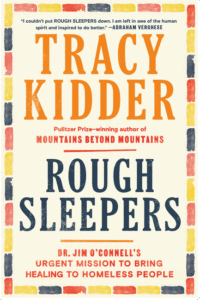
2. Rough Sleepers: Dr. Jim O’Connell’s Urgent Mission to Bring Healing to Homeless People by Tracy Kidder
(Random House)
5 Rave • 3 Positive
“Tracy Kidder, a master of narrative nonfiction, is drawn to self-effacing, unsung heroes who work tirelessly to make the world a better place. Kidder delves deeply into his subjects, deftly weaving the fruits of his research into a strong narrative line that keeps readers turning pages. He doesn’t hide his admiration for his subjects … Rough Sleepers is yet another enlightening reminder from Kidder that we should, and can, do better.”
–Heller McAlpin (The Christian Science Monitor)
3. And Finally: Matters of Life and Death by Henry Marsh
(St. Martin’s)
5 Rave • 2 Postive
Read an essay by Henry Marsh here
“Marsh knows how to set a scene, how to create suspense and how to surprise the reader … For the most part, Marsh does not pretend to answer metaphysical questions about the mind, or even assume that they can be answered by the likes of us … Marsh is often funny, sometimes at his own expense … There’s no false comfort here. Instead, there’s prose that breaks in gentle waves, its undercurrents deep, the surface of an ocean vast enough to put our lives in moral perspective. The narrative takes detours through DIY and dollhouses, hospital décor and Himalayan hikes. Marsh is seated, storytelling, and he is in no hurry.”
–Kieran Setiya (The New York Times Book Review)
Our bounty of brilliant reviews this week includes Charles Arrowsmith on Bret Easton Ellis’ The Shards, Rebecca Mead on Prince Harry’s Spare, Laura Tanenbaum on Jason McBride’s Eat Your Mind, Nikhil Krishnan on Tom Crewe’s The New Life, and Dwight Garner on Graham Rayman and Reuven Blau’s Rikers: An Oral History.
“…it all unravels like a kind of ultraviolent YA novel, Beverly Hills, 90210 meets Henry: Portrait of a Serial Killer. Mercifully, Ellis’ writing elevates the material above his recent movie efforts … This is actually kind of a problem for The Shards, Ellis’ longest novel. It’s one thing if characters are performatively vacant or vacuous — American Psycho and Glamorama are long too, but in those books it’s a joke that no one can keep the characters straight. Without the satirical flourishes, there’s often little to hold onto as the schooldays and coke parties and sex scenes drift by. Though the vibe is well sustained, it feels at times like a miniseries that should have been a movie … Ellis is and has always been in the business of mood: literature as playlist, as locker-room fantasy, as script treatment. That can work well in 200-page zingers like Less Than Zero or Imperial Bedrooms. At 600-pages-plus, The Shards is a harder sell, however sun-drenched and blood-soaked it may be. If you’re interested in the semiotics of Ultravox or the quickest route to Malibu, you’re in for a great time. But The Shards lacks the delirious absurdism and the tight control of Ellis at his best. For all its porno doominess, it often elicits little more than a mild wow.”
–Charles Arrowsmith on Bret Easton Ellis’ The Shards (The Los Angeles Times)

“…much anticipated, luridly leaked, and compellingly artful … King Charles, as he became upon the death of Queen Elizabeth, in September, will not find much to like in Spare, which may offer the most thoroughgoing scything of treacherous royals and their scheming courtiers since the Prince of Denmark’s bloody swath through the halls of Elsinore … Another spectral figure haunting the text of Spare—that of Harry’s ghostwriter, J. R. Moehringer. Harry, or his publishing house…could not have chosen better … Moehringer has what is usually called a novelist’s eye for detail, effectively deployed in Spare … Elevating flourishes like these give readers—perhaps British ones in particular—a shiver of recognition, as if the chords of Jerusalem were being struck on a church organ. But they also remind those readers of the necessary literary artifice at work in the enterprise of Spare, as Moehringer shapes Harry’s memories and obsessions, traumas and bugbears, into a coherent narrative: the peerless ghostwriter giving voice to the Shakespeareless prince. Moehringer has fashioned the Duke of Sussex’s life story into a tight three-act drama … Spare is worth reading not just for its headline-generating details but also for its narrative force, its voice, and its sometimes surprising wit … There is a certain amount of score-settling and record-straightening, which, though obviously important to the author, can be wearying to a reader … Above all, Spare is worth reading for its potential historical import, which is likely to resonate, if not to the crack of doom, then well into the reign of King Charles III, and even into that of his successor … Spare is, you might say, Prince Harry’s Mousetrap—a literary device intended to catch the conscience of the King, and the King after him.”
–Rebecca Mead on Prince Harry’s Spare (The New Yorker)
“…it’s easy to see Acker and her work as a relic of a lost world. The remnants of the downtown scene that lingered when I visited that archive are long gone. The fashion for the postmodern theory that gave her work cachet in academia has faded, often remembered, if at all, as an embarrassing product of a decadent period when tenured would-be radicals, faced with a political reaction, substituted arcane theory for material analysis or action. But Acker had a deep and lasting impact on those who encountered her and her work, as McBride demonstrates. He quotes Neil Gaiman, who updates Brian Eno’s famous line about the Velvet Underground to note that not many people bought Acker’s books, but nearly everyone who did wrote their own books, and wrote them differently than they would have without her. Through the force of her originality and irreverence, Acker’s work outlived the trends that helped elevate it … She wrote about sex work, abortion, pornography, queer sex, kinky sex, trauma, and abuse both explicitly and poetically, in ways that transcended the debates, feminist or otherwise, that swirled around these topics. Like her bohemian heroes, taken more from the European avant-garde than from the American counterculture, she tried to live and write as if the revolution had already happened.”
–Laura Tanenbaum on Jason McBride’s Eat Your Mind: The Radical Life and Work of Kathy Acker (The New Republic)
“One of the ways in which the internal censor makes itself felt is through the familiar prickings of shame, an experience that has linked gay people across generations. And when moral modernizers, in the late nineteenth century, began to argue that homosexuality was no reason for shame—and when, conversely, the perils of their stance were made clear by the public reaction to the trial of Oscar Wilde—gay writers had to confront another, more complex feeling: shame at feeling ashamed, at being afraid, at being a liar. Tom Crewe’s début novel, The New Life, is a genealogy of both kinds of shame, tracing a line back to the first generation of men to seek a way out of these burdens … Crewe distinguishes himself both as novelist and as historian. He has clearly done what G. M. Young, the great scholar of Victorian England, once recommended: to read until one can hear the people speak. Crewe’s Victorians do indeed sound like human beings, not period-piece puppets. He has, more unusually, found a prose that can accommodate everything from the lofty to the romantic and the shamelessly sexy … The element of “alternate history” is all the more potent for its subtlety. Crewe is not trying, wishfully, to give his characters the happy endings they were denied in life. In many ways, his fictional Addington and Ellis have an even harder time of it than their historical counterparts. Imagining them going through the anxieties of a trial becomes a way to probe not only the emancipatory project of Crewe’s eminent Victorians but also the mental toll of their stigmatized sexualities.”
–Nikhil Krishnan on Tom Crewe’s The New Life (The New Yorker)
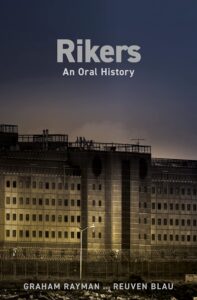
“There is so much material in this book that it’s hard to condense one’s impressions. ‘Futility’ is the first word that comes to mind. Everyone knows that Rikers is worse than a hellhole, the kind of place a civilized society should not countenance, but its problems, despite decades of sound advice from special commissions and elsewhere, seem intractable. Everyone, at this point, stares out at their intellectual opponents like boxers at the start of the ninth round. Reading Rikers, you begin to understand those who have called for closing the prison entirely … [Jan] Morris had a special loathing for bureaucratized cruelty, and she visited courts too for ‘the pure pleasure of offering the accused a smile of sympathy, while eyeing judges, court clerks and self-satisfied barristers with a deliberate look of mordant ridicule.’ The inhumanity described in Rikers: An Oral History makes you want to do something similar with prisons. The final chapters of this book are intensely moving. Rikers changes you; it leaves you worse off than you were before you arrived. People who leave aren’t sent off with much outside this warning about a recidivist curse: ‘When you leave Rikers, don’t ever look back, don’t look back in the car or the bus, or else you’ll come back.’”
–Dwight Garner on Graham Rayman and Reuven Blau’s Rikers: An Oral History (The New York Times)
Laura Zigman’s Small World, Janet Malcolm’s Still Pictures, Leigh Bardugo’s Hell Bent, and Paul Auster’s Bloodbath Nation all feature among the Best Reviewed Books of the Week.
1. Small World by Laura Zigman
(Ecco)
5 Rave • 2 Positive
“Zigman weaves incisive, revealing glimpses into Joyce and Lydia’s early family life, their shared childhood that included both benign and active neglect … This is no pity party, however. Zigman is terrific at melding heartbreaking situations with humorous, evocative details without once veering off into saccharine sentimentality. The Mellishman sisters’ story is alive with vibrant details … In a tale that’s partly about fraught and ruptured relationships, Zigman’s ability to elicit the transformative magic that happens when people find true connection with others makes these pages glow.”
–Daneet Steffens (The Boston Globe)
2. Ghost Music by An Yu
(Grove)
2 Rave • 6 Positive • 1 Mixed
“Spellbinding and atmospheric … With its quiet, dreamy bending of reality and its precise depiction of many different strains of alienation, Ghost Music is an evocative exploration of what it means to live fully — and the potential consequences of failing to do so. Yu braids the mundane and the magical together with a gentle hand … There’s something here of early Murakami’s graceful, open-ended approach to the uncanny, as well as the vivid yet muted emotionality of Patrick Modiano or Katie Kitamura. Like these skillful portraitists of alienation, Yu conjures a visceral in-betweenness where the worlds of matter and spirit meet in a shared, suspended space … Ghost Music inverts the tropes of the ghost story, which often feature spirits acting out in the violent, passionate way of the living…instead drawing the familiar world of human life closer to the enigmatic realm of the dead.”
–Alexandra Kleeman (The New York Times Book Review)
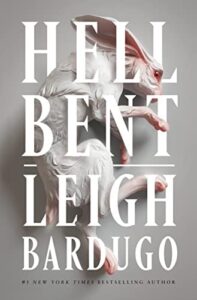
3. Hell Bent by Leigh Bardugo
(Flatiron)
5 Rave
“Once again, Bardugo shows she’s one of the best world builders in the business. Her version of Yale and its people is so richly rendered, it’s difficult to tell what’s real and what’s imagined. Not a page goes by without a line from Yeats or a fact about the architectural history of New Haven or a bit of biblical allusion. And yet, the book whizzes along, marvelously balancing these details with The Da Vinci Code-esque clue-hunting, demonic rituals and lectures from a particularly uptight school administrator. Gut-wrenching and deeply human, this book will tug at your heartstrings even as it chills you to the bone … Standing head and shoulders above the already impressive Ninth House, Hell Bent is one of the best fantasy novels of the year.”
–Chris Pickens (BookPage)
**

1. Still Pictures: On Photography and Memory by Janet Malcolm
(FSG)
5 Rave • 4 Positive • 1 Mixed
“Superb … How could a writer so famously, effectively skeptical of subjective stories write an autobiography? Malcolm solves the problem with characteristic elegance: Nearly every short chapter of Still Pictures is headed by a grainy black-and-white photograph, whose calls to memory she heeds, repels and bargains with in turn by subtle turn. Her comfort with incompleteness becomes a virtue … Most of this memoir consists of appreciative and often very dryly funny memories of her devoted, literate family … Still Pictures has the clarity and brevity of a book by a writer who knows that time is short, and that there’s much to say, much to convey, which will otherwise be lost forever … A lot gets lost in that transition, Malcolm argues in this final, splendid, most personal work of her long career. A lot—but not everything.”
–Charles Finch (The New York Times Book Review)

2. The Half Known Life: In Search of Paradise by Pico Iyer
(Riverhead)
6 Rave • 2 Positive
Read an excerpt from The Half Known Life here
“In Iyer’s hands, the search for paradise, the way out of the ego, doubles as an internal journey … No stranger to the travel genre, the prolific Iyer is after something more here. His chronicle, which begins with an appreciation of the sophistication, beauty and culture of Iran, becomes a requiem for a world—and an existence—estranged from itself … A lonely, nostalgic and haunted quality emerges as Iyer casually intersperses bits of his personal history. There is a formula to many of the chapters … Empathy is not the only thing going on; Iyer is also looking within. And as he looks, things get dizzier and dizzier.”
–Mark Epstein (The New York Times Book Review)

3. Bloodbath Nation by Paul Auster
(Grove)
3 Rave • 4 Positive • 2 Mixed
“Brief but remarkably moving … Though Auster’s arguments will be familiar to anyone who has followed gun control debates closely, the author’s overview is exceptional in its clarity and arresting in its sense of urgency … A harrowing, haunting reflection on the routine slaughter wrought by guns.”
Our smogsboard of sumptuous reviews this week includes Erin Somers on George Saunders’ Liberation Day, Jennifer O’Connell on Prince Harry’s Spare, Hamilton Cain on Stephen Markley’s The Deluge, Lauren LeBlanc on Darryl Pinckney’s Come Back in September, and Mark Epstein on Pico Iyer’s The Half Known Life.
“What end do Saunders’s inventions serve? They are tests of empathy, trolley problems of a sort: whom to save and how many. The correct way out of a Saunders trap is to choose the other person; only then does a character glimpse transcendence. But despite these stories’ generosity, humor, ingenuity, and sharp social satire, the constant focus on empathy begins to feel coercive—imposed on readers as well as the protagonists. Is empathy really the be-all and end-all? Is this a project ambitious enough for a writer of Saunders’s talents? Are there no heights to scale beyond it? … His stories are hilarious, imaginative, thrilling on the language level, moving and absurd. To read them is to feel awed by the author’s dual capacity for silliness and darkness … For this reason, it is perhaps unfair to assess Liberation Day in the context of its exemplary predecessors. It may not be Saunders’s best collection, but that is in part because the field is so crowded … There’s a religiosity in Saunders’s insistence that empathy can deliver a person to a higher plane. But presented over and over, even in stories that impress with their invention, entertainment value, and critique of consumerist culture, this insistence starts to feel precious and a little stale … However, the collection’s final story, ‘My House,’ explores something else: not just love or its absence but the formation of hate…Here is a topic that’s new to Saunders and worthy of his prodigious imagination: the subtle winds that shift the psyche, the mysteries of human interaction. The characters of this story are fragile and complex. They are fickle and burning up with bitterness. There are no saints here.”
–Erin Somers on George Saunders’ Liberation Day (The Nation)
“Curiously lacking in self-awareness … This has been billed as the most explosive royal memoir in history, but it feels more like the heart-rending story of a man stuck forever in the past … For all that Harry comes across as sympathetic and vulnerable in parts, for all the deliciously gossipy bits…the book mostly feels like a long act of retribution … The title of the book is Spare, but Harry spares no one, least of all William. Many of the sources of his resentment feel like normal sibling squabbles, except that normal sibling squabbles don’t end up forming the backbone of a bestselling memoir, locked forever into a nation’s historical record … What save the book from being a long, entitled whingefest are the moments of genuine emotional intensity—and the gloriously bitchy insights into a family that is deeply, irretrievably weird … Harry claimed in his many interviews this week that he is happier than he has ever been and ‘at peace.’ But the evidence of this book suggests otherwise. He may well be happy, but this is not the account of a man at peace.”
–Jennifer O’Connell on Prince Harry’s Spare (The Irish Times)
“Bracing, beguiling, uneven … The dystopia is realistic and nuanced, grim but playful, setting Markley’s book apart from the tsunami of recent climate-change literature … The Deluge is long on ambition. It’s also long, weighing in at nearly 900 pages—baggy, restless, immersive. Centrifugal forces threaten to tear it apart, but Markley soldiers on, in hyper-real mode … The caricature wears thin and the jokes don’t always land … This poses a problem in the second half, where Markley’s humor and flair flatten beneath the seriousness of his purpose. He targets the inertia of our political institutions while lampooning online culture … As The Deluge drags on, it loses its impact. It may endure as a climate-fiction classic, but it’s less than the sum of its parts, undermined by its length and labyrinthine design. The string of apocalyptic events seems cartoonish rather than cautionary … Markley’s right to peer forward, though: defiant, Cassandra-like, screaming into the void. Novelists often preen as moralists, but he’s the genuine article. As humanity hurtles needlessly toward catastrophe, the powerful make and break the rules, dodging accountability and sucking up resources. Meanwhile, it’s getting hot in here, and there, and everywhere.”
–Hamilton Cain on Stephen Markley’s The Deluge (The New York Times Book Review)
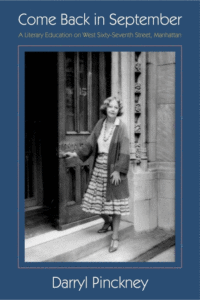
“Hardwick’s role as Pinckney’s mentor was different from that as a teacher; nurturing talent was something more sacred and essential than instruction … By welcoming Pinckney, as an equal, into her home and among her friends, she helped him realize that there was a place for him in the world of letters. For a young man hungry to burst past the limits of his experience, there could be no better circle in which to insinuate himself. Hardwick benefited as well: The relationship was a means of reinvention and renewal, in which her ideas, too, could flourish … But this wasn’t utopia. Throughout the memoir, Pinckney and his peers grapple with familial expectations and judgments, as well as with the threat of AIDS. New York had been an escape for these precocious undergraduates who kept their sexuality a secret from their families back home; mentors like Hardwick provided the answers and advice that they couldn’t get from their biological families … Pinckney notes the friction that surfaced between Hardwick, an older white woman from the South, and himself, a young, Black, gay man from the Midwest, recalling instances when her language was insensitive or even offensive. Beyond these tensions, there was also Hardwick’s frustration at her own stalled ambitions, which seemed to manifest itself through admonishments of Pinckney …Ultimately, this is not only a book about the drama of these deep, lifelong relationships. What Pinckney seems to want to elevate is their best elements: enthusiasm, forgiveness, support, continuity. Time trudges on, and from afar, Pinckney receives word of friends and colleagues who have passed away. With these losses, the memoir closes on a bittersweet note. Pinckney remembers Hardwick quoting the poet Marianne Moore: ‘After everything we have loved is lost, then we revive.’ Literary mentorship offers the power of a phoenix. Even at a writer’s lowest point, the lifeline of conversation and intellectual exchange urges them forward.”
–Lauren LeBlanc on Darryl Pinckney’s Come Back in September: A Literary Education on West Sixty-seventh Street, Manhattan (The Atlantic)
“In Iyer’s hands, the search for paradise, the way out of the ego, doubles as an internal journey. Skittering from the gardens of Iran’s holiest mosques to the car-free streets of North Korea’s capital, from the avenues of East Belfast to war-torn Kashmir’s Dal Lake houseboats, from the outback of aboriginal Australia to the Ethiopian chapels of Jerusalem, from the empty moonscape of Ladakh to the massive stone Buddhas of Sri Lanka, from the graveyards of Japan’s mountain temples to the burning ghats of Varanasi, this elliptical odyssey, graced with occasional notes of light, finds itself by dwelling in the shadows … No stranger to the travel genre, the prolific Iyer is after something more here. His chronicle, which begins with an appreciation of the sophistication, beauty and culture of Iran, becomes a requiem for a world—and an existence—estranged from itself … A lonely, nostalgic and haunted quality emerges as Iyer casually intersperses bits of his personal history. There is a formula to many of the chapters … Empathy is not the only thing going on; Iyer is also looking within. And as he looks, things get dizzier and dizzier.”
–Mark Epstein on Pico Iyer’s The Half Known Life (The New York Times Book Review)
Tom Crewe’s The New Life, Parini Shroff’s The Bandit Queens, Martha C. Nussbaum’s Justice for Animals, and Matthew Dennison’s Roald Dahl: Teller of the Unexpected all feature among the Best Reviewed Books of the Week.
1. The New Life by Tom Crewe
(Scribner)
6 Rave • 1 Positive
Read an excerpt from The New Life here
“Intricate and finely crafted … There is always a narrative risk when recapitulating events in historical fiction—predetermination can deaden the pulse. Crewe, who earned his Ph.D. in 19th-century British history from the University of Cambridge, makes no such error. He attentively constructs rich, human motivations and contradictions for his fictionalized renderings of John and Henry … Crewe uses the interior depth of John and Henry to build intrigue, creating provocative developments even without the use of overtly dramatic plot points … The New Life brims with intelligence and insight, impressed with all the texture (and fog) of fin de siècle London. Crewe’s prose is stylish and precise, reminiscent of Alan Hollinghurst’s. The novel falters only in its later chapters, when John begins a self-destructive streak that is too flatly written to be believable. Otherwise, the writing is exquisite … For all its historical fixtures, the novel is energized by timeless questions.”
–Peter Kispert (The New York Times Book Review)
2. The Bandit Queens by Parini Shroff
(Ballantine)
3 Rave • 1 Positive • 1 Mixed
Read an essay by Parini Shroff here
“Shroff’s debut novel is at once immensely sad—women want Geeta to help them get revenge on rapists and even a husband who threw acid on his wife’s face—but it has laugh-out-loud moments too, as the women learn to stand up to the men in their village, and Geeta forms a relationship with a good man and learns to make friends … This is a deeply human book, with women surviving and overcoming in their culture while still remaining a part of it.”
–Jennie Mills (Library Journal)
3. Brotherless Night by V. V. Ganeshananthan
(Random House)
3 Rave • 1 Positive
Read an essay by V. V. Ganeshananthan here
“Perhaps Ganeshananthan’s finest achievement in Brotherless Night is showing, with meticulous accuracy, what it feels like to inhabit a day-to-day life onto which someone else, from the privilege of great distance, can throw a word like ‘terrorism,’ and be done … Ganeshananthan is a writer of remarkable restraint. Occasionally a precious exclamation mark finds its way into an especially cataclysmic scene, or the narrator might feel the air rushing out of her lungs or her hand involuntarily covering her mouth at the news of a loved one’s death; but otherwise the prose is almost unsatisfyingly steady. And yet, in tone and emotional register, Sashi’s storytelling is a perfect fit for the delicate balance she is forced to walk by virtue of living in a society where running afoul of the dominant forces, saying the wrong thing, leveling too impassioned a rebuke, can prove a capital offense … The narrator’s deliberative mode of describing her life feels, by the end of the novel, like the only way this story could have been told … And when she wants to, Ganeshananthan can loosen her restraint to pull off gorgeous sentences.”
–Omar El Akkad (The New York Times Book Review)
**
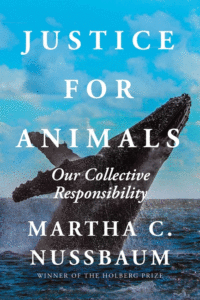
1. Justice for Animals: Our Collective Responsibility by Martha C. Nussbaum
(Simon & Schuster)
3 Rave • 1 Positive
“Urgent … In this brilliant and accessible work, Nussbaum develops an account of the moral lives of animals that is stronger than other philosophers’ accounts and relevant to the efforts of humans seeking to build a better, more just world for all animals … Although Justice for Animals is written to address general readers, Nussbaum works through, in lively and accessible fashion, key philosophical questions about animals and ethics … Nussbaum does not avoid difficult questions … All readers, not only readers already committed to animal rights, ought to read Nussbaum’s new book. Following Nussbaum’s arguments, we can discover new ways of seeing animals with wonder and compassion. And we can hone our senses of outrage and use that outrage to fuel our efforts to build a better world for all us animals.”
–Ross Collin (Chicago Review of Books)
2. Have You Eaten Yet?: Stories from Chinese Restaurants Around the World by Cheuk Kwan
(Pegasus Books)
1 Rave • 4 Positive
“Flavorful descriptions of foods mix with adventuresome travel mishaps. Less-remembered history surrounding the Ming dynasty’s venturing into Africa, and how Chinese people fared under apartheid, enrich the book, while sprinklings of film references are hip, atmospheric flourishes. Here, traveling encompasses word-of-mouth scouting for film locations from the Amazon to Norway, but also lessons in ethnography. The stories of women in particular are resounding, encompassing both vulnerability and stalwart resolve. Have You Eaten Yet? is a fascinating, inquisitive global search for Chinese tastes that evoke home in any corner of the world.”
–Karen Rigby (Foreword Reviews)
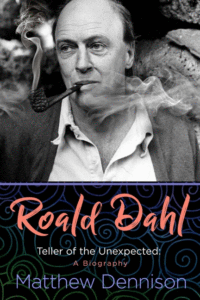
3. Roald Dahl: Teller of the Unexpected by Matthew Dennison
(Pegasus Books)
1 Rave • 4 Positive • 1 Mixed • 1 Pan
“A sadness pervades this book: despair. Dahl had pockets of tenderness—he gave the fee from one magazine piece to an airman’s widow, and he tried to answer all the letters he received from children—but I think this book is a portrait of depression, which is buried rage … This book is riveting, and immaculately written. What it lacks—probably because Dahl himself did—is a vivid inner life: it is as if he gave it all to the novels. There is something shrouded about Dennison’s account, something unspoken … Reading Dennison’s account, all I can feel is pity, for a man so raging, and a boy so lost.”
–Tanya Gold (The Telegraph)
Our bouquet of brilliant reviews this week includes Sam Byers on Bret Easton Ellis’ The Shards, Alexandra Kleeman on An Yu’s Ghost Music, Merve Emre on Matthew Dennison’s Roald Dahl: Teller of the Unexpected, Sam Adler-Bell on A Private Spy, and Omar El Akkad on V. V. Ganeshananthan’s Brotherless Night.

“The Shards isn’t just Ellis’s strongest novel since the 90s, it’s a full-spectrum triumph, incorporating and subverting everything he’s done before and giving us, if we follow the book’s ingenious, gleefully self-aware conceit, nothing less than the Ellis origin story … Superficially, The Shards cleaves to Ellis’s well-established aesthetic. The dialogue is deadpan, the atmosphere paranoid and tacitly hostile. Sex is graphic and anhedonic; violence is lurid and sexualised. But beneath the coldness and carnage, a new, gentler quality is detectable. Where Ellis’s last work of fiction, 2010’s Imperial Bedrooms, was hyper-distilled and suffocatingly grim, The Shards is dreamlike and expansive, with longer sentences and a slower pace … As the book and its characters move towards a shattering state of “exalted understanding”, we realise the precision and subtlety of its metatextual structure. The concluding violence is both climax and origination. Out of the blood-spatter and dismemberment, Ellis’s ‘numbness as ecstasy’ style, his ‘prince of darkness literary persona,’ is born. Or so Ellis would have us believe … Such is the brilliance of The Shards. In its hall of shattered mirrors, Ellis is everywhere. But the corpse at our feet is the culture, dismembered.”
–Sam Byers on Bret Easton Ellis’ The Shards (The Guardian)
“…certain novels give the impression of being animated by a force that has little to do with their ordered combination of words. Instead these narratives seem to orbit their own expression: They exist beyond language, above it, or maybe even below it—who could say of something as elusive as story precisely how or where it eludes? An Yu’s second novel, the spellbinding and atmospheric follow-up to her 2020 debut, Braised Pork, is a meditation on this dreamlike layer of existence … With its quiet, dreamy bending of reality and its precise depiction of many different strains of alienation, Ghost Music is an evocative exploration of what it means to live fully—and the potential consequences of failing to do so … There’s something here of early Murakami’s graceful, open-ended approach to the uncanny, as well as the vivid yet muted emotionality of Patrick Modiano or Katie Kitamura. Like these skillful portraitists of alienation, Yu conjures a visceral in-betweenness where the worlds of matter and spirit meet in a shared, suspended space.”
–Alexandra Kleeman on An Yu’s Ghost Music (The New York Times Book Review)
“The pleasures of making it big and making it small and not noticing or caring who gets hurt in the process—this is the gimmick on which nearly all Dahl’s children’s books turn, the gimmick that reveals the hollowness at their center…The books that are not gleefully Victorian, with their orphans and prisons and imperialist nostalgia, are more fabulist, layering some anthropomorphic twist onto their manipulations of size … Dahl’s fictions of scale are the stupidest and crudest I have encountered…With few exceptions, size, in Dahl’s imagination, is nothing more than a proxy for force. Largeness indicates the power to manipulate and coerce; smallness indicates vulnerability to punishment and annihilation that must be overcome through trickery. Even his happiest endings left my children listless and a little depressed, as if they intuited that what had seemed at first to be the pursuit of justice in an unjust world was nothing more intriguing than a game of bloody knuckles, a theater of schoolboy cruelty … There is, of course, nothing inherently wrong with cruelty in art; in children’s literature, it has its place, particularly when it responds to the physical and emotional cruelties inflicted upon children, among the most powerless and casually brutalized creatures in the world. Yet the sadism of Dahl’s plots and the grotesquerie of his characters contain not a single germ of critical self-reflection, not one gesture of liberation, not a drop of pity or compassion, no matter how begrudgingly they may be tendered, in life as in fiction. The cruelty of his villains begets a reciprocal cruelty in their victims … Matthew Dennison’s Roald Dahl: Teller of the Unexpected is thin gruel. It is a stylish but curiously pointless biography, the kind that neither uncovers anything new nor casts what was already known in an interesting light…It is worth noting that Dennison is mostly a biographer of grand English ladies…and one cannot help but wonder if his latest is a chummy attempt to redeem a beloved British cultural export now that the royals have proved themselves to be beyond redemption.”
–Merve Emre on Matthew Dennison’s Roald Dahl: Teller of the Unexpected (The New York Review of Books)
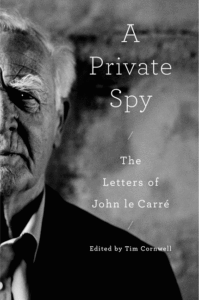
“That A Private Spy is now haunted by two ghosts—the father and the son—is bleakly resonant. As his letters attest, le Carré was tormented by his own (long dead) father to the very end of his life … The anarchic distress of growing up under Ronnie Cornwell’s thumb, le Carré believed, had established the blueprint for his own circuitous yearnings: his infidelity, his anguished morality, his self-sabotage and falseness. Every accusation made against Ronnie was a counteraccusation against himself … Le Carré attributed his skill as a writer, and as a spy, to a childhood under siege. His writing is alert to physical detail and subtle changes in emotional weather, a quality instinctive to children raised in perilous homes; likewise, he displays a childlike eagerness and capacity to imagine himself into other minds and other families. The neglected child is gifted a too-early awareness that he is merely cast in the role of Son, and that the nuances of his performance, its success or failure in various scenes, can have dire consequences. If he is haunted later in life by a sense of his own falseness, that is because he learns mimicry and compliance, how to satisfy the needs and whims of others, long before he has developed a clear sense of his own .. Despite this marital stability, his literary fame and wealth, le Carré’s letters paint a picture of a restless, searching, and divided soul, often at war with himself, sensitive to slights yet capable of great magnanimity; ingratiating in one moment, derisive in the next; variously indulgent and abstemious, garrulous and guarded.”
–Sam Adler-Bell on A Private Spy: The Letters of John le Carré (The Baffler)
“…the author’s sophomore novel…isn’t really about terrorism or terrorists. It’s about all the ugly little human complexities those words are designed to obliterate, about what it means to have a much less straightforward relationship with violence and the people responsible for it … Leading with its stark prologue, the novel employs the same kind of deceptive gambit as Johannes Anyuru’s They Will Drown in Their Mother’s Tears, which begins with a scene of Muslim terrorists storming a Swedish bookstore event for the author of a collection of cartoons of the prophet Muhammad, before pulling the rug out from under the reader’s feet with alternate timelines and unexpected turns. Brotherless Night does something almost as dangerous but much more grounded: It takes the presumed terrorists of that opening page and shades them in, shows them for all their conflicting impulses. The narrator of this story is not neutral—she judges, indicts, but based on the entirety of a person’s character. She has no other choice: These are her people, too close to be flattened into moral neatness … in tone and emotional register, Sashi’s storytelling is a perfect fit for the delicate balance she is forced to walk by virtue of living in a society where running afoul of the dominant forces, saying the wrong thing, leveling too impassioned a rebuke, can prove a capital offense.”
–Omar El Akkad on V. V. Ganeshananthan’s Brotherless Night (The New York Times Book Review)
It was truly difficult to narrow down 2023’s science fiction and fantasy offerings, and even this list feels like an overabundance. But how could I not highlight alien abduction road trip comedies, time travel nostalgia trips, shadowy secret societies, and surprise standalones from some of my very favorite authors? Whether you’re looking to pick up a new series, or dip into a novella or collection, this is the impressive beginnings of quite the 2023 TBR pile.
*

Hell Bent by Leigh Bardugo
(Flatiron Books, January 10)
Somehow I didn’t remember that Ninth House, Leigh Bardugo’s adult paranormal fantasy debut (after the wildly popular Grishaverse YA series), came out before the pandemic. This dark academia tome reimagined Yale’s Ancient Eight secret societies as practitioners of black magic, witnessed through the eyes of Galaxy “Alex” Stern, who earns her way into the Ivy League school thanks to her ability to see ghosts. But it’s not a free ride; Alex is part of the Lethe, who oversee the skull-and-bones-and-sorcery at the heart of Yale. And when her mentor Daniel “Darlington” Arlington is cast into hell, Alex must flex her abilities as a Dante to rescue her Virgil, even after the Ninth House has withdrawn its support and her future with them is at stake.
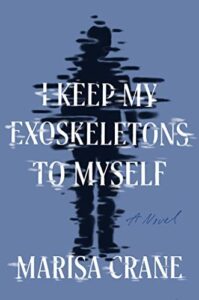
I Keep My Exoskeletons to Myself by Marisa Crane
(Catapult, January 17)
What a way to start the new year, with this queer speculative debut that brings to mind the best of Black Mirror, hurtling at the anxious pace of “The Entire History of You” but with “San Junipero”’s depth of feeling. Marisa Crane envisions an all-too-plausible future in which the Department of Balance weighs down wrongdoers with second (or third, or fourth) shadows as constant reminders of basically any crime that challenges the status quo. Disenfranchised and indelibly stamped with evidence of their past sins, Shadesters have no option but to lag behind the morally superior NoShads. Kris is a sudden widow and single mother, struggling to take care of “the kid,” who has been slapped with a second shadow for the crime of killing Kris’ partner Beau in childbirth. Crane’s shadows metaphor is effective yet restrained, with their prose—as Kris grapples with grief and shame and feeling lost—coming through sharp and affecting.
The Terraformers by Annalee Newitz
(Tor Books, January 31)
Through three interrelated novellas set on the same future planet of Sask-E, Annalee Newitz brings hope but also grim pragmatism to the question of terraforming: Yes, humanity will find a home after Earth… but also yes, capitalism will threaten its continued survival three times over. Biohacked planet rangers, sentient trains, robots, and feline reporters are among the varied cast of characters grappling with futuristic yet familiar conflicts: urban planning new transit networks, gentrification pushing out existing residents, and the need for mutual aid.
The God of Endings by Jacqueline Holland
(Flatiron Books, March 7)
It’s been a while since I’ve found a proper, generations-spanning epic; here, instead of a traditional family tree, it’s the infinite lifetime of an immortal woman. In 1984, Collette LeSange runs an elite arts school for children in upstate New York, devoting her seemingly friendless life to their education. A hundred and fifty years ago, she was Ana, a child orphaned by tuberculosis sweeping through her village, only to be plucked from death by a mysterious stranger. Ana’s “grandfather” turns her into a vampire like himself, setting her up for the double-edged sword of eternal life but also eternal loneliness… until Collette’s encounter with a particularly gifted child dovetails with her own gnawing hunger.
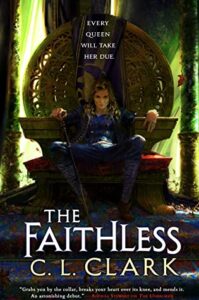
The Faithless by C.L. Clark
(Orbit Books, March 7)
In anti-colonialist epic fantasy The Unbroken, C.L. Clark deftly balanced the perspectives of soldier Touraine and princess Luca, grappling with the system (that is, the Balladairan empire) that shaped them but that will never fully accept them unless they break something. What made the book such a standout was how Clark simultaneously engaged with the big ideas yet also focused on the small, physical moments: a fight in the dirt, a gown fitting, a pivotal dance at a ball, a touch that changes everything. With the second volume of the Magic of the Lost trilogy hinging on a “Trial of Competence”—but also on Luca and Touraine reuniting after their fraught ending in the first book—I just can’t wait. Also, that cover, whew.
Lone Women by Victor LaValle
(One World, March 21)
The latest from the Changeling author is a historical Gothic horror set in the era of homesteading, as “lone women” set out on their own. In 1915, Adelaide Henry shows up in Montana lugging a massive steamer trunk, fleeing the charred remains of her childhood home in California… and the bodies of her parents. Even though Adelaide is well aware of her many disadvantages in the already brutal practice of homesteading as a single Black woman, she has something no one else has: a secret sin lurking in that trunk, which must always be locked, but which may also be the key to surviving on the homestead. What began as a short story in the historical speculative fiction collection Long Hidden has been fleshed out into a compelling narrative about a woman on the margins of history, clawing her way into the main text.
Flux by Jinwoo Chong
(Melville House, March 21)
From its opening second-person address, Jinwoo Chong’s experimental debut brings to mind Charles Yu’s similarly genre-bending novel Interior Chinatown: Both express a deep affection for Hollywood nostalgia, cut through with the bittersweet reckoning with their imperfect heroes who nonetheless made for unprecedented representation. In Flux, that’s fictional detective Thomas Raider, an Asian-American icon to viewers like Brandon, one of three protagonists whose lifelines become braided as he suspects that his company has mastered time travel. While there’s sure to be fascinating timeline shenanigans, I’m most drawn in by Chong’s clear understanding of what it means to see yourself for the first time in a fictional character.
White Cat, Black Dog: Stories by Kelly Link
(Random House, March 28)
MacArthur Genius Grant fellow Kelly Link’s latest collection reworks seven fairy tales (from the Brothers Grimm, of course, but also French and Scottish origins) in fantastic modern contexts. Hansel and Gretel must escape a very different sort of hunger on a planet of vampires; a house-sitting gig is the setting for a portal fantasy; and the white cat of the title turns out to run a weed dispensary. There are layovers in airports (familiar) and wealthy fathers sending sons on absurd quests—also familiar, but in a much more bone-deep way in the retellings of such symbolic stories. Plus, each of these tales is illustrated by Shaun Tan (The Arrival).
Rose/House by Arkady Martine
(Subterranean Press, March 30)
After her Teixcalaan space operas A Memory Called Empire and A Desolation Called Peace, Arkady Martine has become an auto-read author for me. So imagine my delight to discover that she’s written a new novella! Subterranean Press will publish Rose/House, a far-future speculative haunted house story about an AI edifice enclosing a murder mystery. While many a house outlives the person who built it, Rose House is unique: Architect Basit Deniau imbued every beam and dust mote of Rose House with its artificial intelligence, so that the house has been self-aware since long before his death. But when Rose House notifies the China Lake Police Precinct of a death within its walls, it will take tricky maneuvering to get inside—because the only person Rose House is programmed to let in is Dr. Selene Gisil, Basit’s estranged protégée. For such a short novella, Martine infuses it with the creeping dread of walking through a house where the walls don’t just talk, they think and plot and perhaps even lie.

Translation State by Ann Leckie
(Orbit Books, June 6)
Ann Leckie’s Imperial Radch trilogy stretched new bounds of sci-fi worldbuilding, from the ubiquitous usage of “she” pronouns to cloned emperors pitted against one another—and the utterly terrifying alien Presger, who sort other species into what they deem Significant or Insignificant. What we do know about the Presger is all several degrees removed; the series gave us a mostly amusing character in genetically modified human translator Zeiat… but then you start thinking about what kind of alien has to reshape humans to be their intermediaries. The Presger are kind of the bogeymen, and Leckie’s latest standalone looks to lift back the veil on their alien society through another translator-in-training, Qven, who does the unthinkable by rebelling against their destiny. All the while, the long-awaited Conclave will determine which humans survive into continued Significance.
Flight & Anchor by Nicole Kornher-Stace
(Tachyon Publications, June 13)
Since the publication of Archivist Wasp in 2015, Nicole Kornher-Stace has whisked readers through a post-apocalypse populated by the ghosts of supersoldiers and the Archivists who catalog what happened in the world before theirs. The followup Latchkey cemented this engaging world and especially its depiction of platonic friendships, written with the care and depth that these relationships deserve. Last year’s somewhat standalone Firebreak expanded the scope of the Archivist Wasp universe, a video game thriller that does Ready Player One one better. And now, Kornher-Stace has brought us another story within that universe: Flight & Anchor, following two of that book’s characters (supersoldiers known only as 06 and 22) as twelve-year-olds on a misadventure in a shipping container in a wonderful homage to The Boxcar Children. Watching Kornher-Stace play within her own realms is a delight, and the added nostalgia factor of this book makes it a can’t-miss.
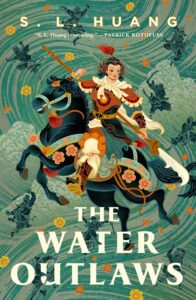
The Water Outlaws by S.L. Huang
(Tordotcom Publishing, June 20)
I was first introduced to S.L. Huang’s dynamic speculative fiction through the sci-fi thriller Zero Sum Game. Their foray into fairy tales was effortless, as their novella Burning Roses married the stories of Red Riding Hood and Hou Yi. Huang’s forthcoming fantasy novel The Water Outlaws is the perfect next project, reimagining the Chinese classic Water Margin. Described as a Robin Hood tale predating Robin Hood, it’s considered one of the first wuxia stories about a group of bandits pulled from society’s margins. Drawing upon their other lives as a stunt performer and armorer, Huang updates the story with genderswapping, quips, and an exuberant action heist narrative.
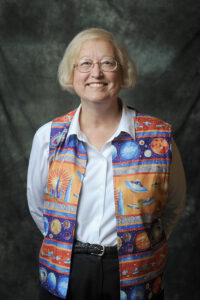
The Road to Roswell by Connie Willis
(Del Rey, June 27)
Crosstalk, Connie Willis’ 2016 screwball comedy by way of a Black Mirror-esque mindreading premise, was the rare book where upon finishing it I immediately went looking for fanfiction on Archive of Our Own (and lo, they delivered!). I’ve got a similar good feeling about what sounds like a comedy of errors that mashes up a wacky wedding story with all of our pop cultural baggage attached to Roswell and Area 51. When bridesmaid Francie gets abducted before her best friend’s UFO-themed wedding, she finds herself siding with the unexpected alien who may need more help trying to outrun a human government that wants to probe him.
The Splinter in the Sky by Kemi Ashing-Giwa
(Saga Press, July 11)
I love love SFF revolving around tea, from Ann Leckie’s Radchaai empire building humanity’s future on such rituals to the tea monk adventuring in Becky Chambers’ Monk & Robot novellas. What’s especially fantastic about Kemi Ashing-Giwa’s space opera debut is that its protagonist Enitan supports her real passion for tea with her stultifying day job as a scribe for the Ominirish Republic. But when the Holy Vaalbaran Empire delivers a one-two punch by assassinating her lover and kidnapping her sibling, it’s not Enitan’s skills with the stylus that will save them—tea is her way to infiltrate Vaalbaran society, as a political prisoner recruited into spycraft.
Camp Damascus by Chuck Tingle
(Tor Nightfire, July 18)
Somehow in the past five years, Chuck Tingle went from a punchline (my coworkers would outdo one another to find his most outlandishly titled-and-Photoshopped self-published erotica) to a queer speculative icon. While his erotica continues to incisively pound the news cycle and modern pop culture in the butt, I can’t wait to see what he does with a more traditional horror structure: His debut with Tor Nightfire is a chilling tale set at a gay conversion camp in Neverton, Montana, told from the perspective of God-fearing Rose, who doesn’t want what (or who) girls are supposed to want, and who can see the secret people lurking in the Neverton woods. Love is real, but so are the scares.
Blade of Dream by Daniel Abraham
(Orbit Books, July 18)
At the start of this past year, Daniel Abraham (one of the co-writers behind the Expanse series) launched an intimate fantasy trilogy in which three different stories unfolded within the city of Kithamar. Age of Ash followed street rats Alys and Sammish, as loss and a shadowy brotherhood intertwined their paths with an ancient being. Blade of Dream moves through Kithamar’s class system to the merchant tier, as Garreth struggles against the life path already laid out for him. Of course there’s a girl, but we already know to expect other conspiracies among mortals, and those ancient gods with their own connections to this human city.
Silver Nitrate by Silvia Moreno-Garcia
(Del Rey, July 18)
Silvia Moreno-Garcia’s most recent horror novels have deftly melded historical settings with classic tropes of the genre, like recontextualizing the Gothic horror narrative in 1950s Mexico City through the eyes of a socialite investigating her sister’s sinister in-laws (in Mexican Gothic) and transporting The Island of Doctor Moreau to southern Mexico through the eyes of The Daughter of Doctor Moreau. But there’s something about her latest, set in 1990s Mexico City, that especially intrigues: Silver Nitrate explores the familiar chiller narrative about a cursed film and an auteur who nonetheless yearns to complete his final project no matter the price. In this case, it takes Montserrat, a talented yet overlooked sound editor, and her former soap opera star friend (and unrequited love) Tristán, to be the fresh eyes on horror director Abel Urueta’s work. But what if his story about Nazi occultists ensorcelling silver nitrate stock is actually true? And what if that transfers the curse onto these young artists? Aaand action!

Cassiel’s Servant by Jacqueline Carey
(Tor Books, August 1)
It’s difficult to pull off a retelling, especially of a novel as beloved as Kushiel’s Dart, from another perspective once the readers already know how things work out. But Jacqueline Carey built the world of her lushly epic fantasy romance so compellingly that you want to explore its every corner and interrogate every nuanced player in the game of thrones. So just because we’ve heard Phèdre nó Delaunay’s account of her early years as a courtesan-spy—full of sensual assignations, double-crosses, and flight across other countries—that doesn’t mean we know everything. And the perfect man to fill in the blanks is Joscelin Verreuil, Phèdre’s austere Cassiline bodyguard, who will watch her play with fire (literally and figuratively) with the cunning Melisande Shahrizai, all while falling hopelessly in love with her.

Alecto the Ninth by Tamsyn Muir
(Tordotcom Publishing, fall TBD)
Harrowhark Nonagesimus is in Hell, and that’s all we know about the final (!) volume of the Locked Tomb series. Last year’s Nona the Ninth gave us a stay of execution on this bonkers, gory, heartrending quartet, but all good things must come to an end. And if Tamsyn Muir has taught us anything, there’s never really an end during the myriad of the Emperor Undying, the Necrolord Prime.

Jonathan Abernathy You Are Kind by Molly McGhee
(Astra House, October TBD)
Former Tor Books assistant editor Molly McGhee went viral earlier this year for laying out the bleak truth that a publishing worker can have a New York Times bestselling book yet still be so failed by the industry that they cannot afford to stay within its low-paying constraints. McGhee has also been a vocal supporter of the HarperCollins Union, signal-boosting online and rallying in-person. All of this makes me even more eager to read her debut novel, a speculative reckoning with late-stage capitalism through the eponymous Jonathan Abernathy, who pays off his student loan debt by “auditing the dreams of white collar workers, flagging their anxieties and preoccupations for removal” (from the official announcement). Hits chillingly close to home, right?

Exordia by Seth Dickinson
(Tordotcom Publishing, October 17)
While I breathlessly await the next installment of Seth Dickinson’s heartrending geopolitical fantasy series about Baru Cormorant, I’m delighted to see that he’s playing in the sci-fi sphere in the meantime. Exordia is an expletive-laden first-contact story between Kurdish genocide survivor Anna Rekani and Ssrin, an eight-headed viper alien that only she can see. With vibes of Independence Day (except where the extraterrestrials are at least our frenemies) and Michael Crichton, this bonkers-sounding adventure is high-concept, horrific, and perfect to fill the Baru-sized hole in my TBR.

